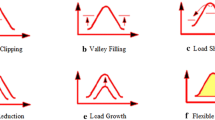Abstract
Demand Response (DR) is the strategy adopted by the electric utility company to shift the energy consumption plan hours to the off-peak period. Usually, the optimization models of DR plan to cut down the energy consumption at peak period to reduce the customer cost of electricity. The need of the problem is the real-time optimization that focuses on residents with uncompromised electricity usage and reduced cost. With the advent of smart meters the customers can participate in the Dynamic Demand Response (DDR) program offered by the utilities. In this paper, the task of optimal load scheduling is formulated as the optimization problem and an improved genetic algorithm is applied to solve this problem. The performance of the proposed approach has been evaluated by the load data set and the simulation results are reported.
Access this chapter
Tax calculation will be finalised at checkout
Purchases are for personal use only
Similar content being viewed by others
References
Soares A, Gomes Á, Antunes CH, Cardoso H (2013) Domestic load scheduling using genetic algorithms. EvoApplications 2013, LNCS 7835. Springer, Berlin, Heidelberg, pp 142–151
Ullah I, Khitab Z, Khan MN, Hussain S (2019) An efficient energy management in office using bio-inspired energy optimization algorithms. MDPI Process 7:142. https://doi.org/10.3390/pr7030142
Zhao Z, Lee WC, Shin Y, Song K-B (2013) An optimal power scheduling method for demand response in home energy management system. IEEE Trans Smart Grid 4(3)
Yuce B, Rezgui Y, Mourshed M (2016) ANN-GA smart appliance scheduling for optimised energy management in the domestic sector Energy Build 111:311–325. https://doi.org/10.1016/j.enbuild.2015.11.017
Agamah US, Ekonomou L (2017) Energy storage system scheduling for peak demand reduction using evolutionary combinatorial optimization. Sustain Energy Technol Assess 23:73–82
Paridari K, Parisio A, Sandberg H, Johansson KH (2015) Demand response for aggregated residential consumers with energy storage sharing. In: 015 IEEE 54th annual conference on decision and control (CDC) 15–18 Dec 2015. Osaka, Japan
Allerding F, Premm M, Shukla PK, Schmeck H (2012) Electrical load management in smart homes using evolutionary algorithms. In: Hao J-K, Middendorf M (eds) EvoCOP 2012. LNCS 7245. Springer Heidelberg, pp 99–110
Gao B, Liu X, Zhang W, Tang Y (2015) Autonomous household energy management based on a double cooperative game approach in the smart grid. Energies 8(7):7326–7343
Roy T, Das A, Ni Z (2017) Optimization in load scheduling of a residential community using dynamic pricing. In: 2017 IEEE power & energy society innovative smart grid technologies conference (ISGT) Washington, DC, 2017, pp 1–5
Elkazaz MH, Hoballah A, Azmy AM (2016) Artificial intelligentbased optimization of automated home energy management systems. Int Trans Electric Energy Syst
Tsui KM, Chan SC (2012) Demand response optimization for smart home scheduling under real-time pricing. IEEE Trans Smart Grid 3(4):1812–1821
Kim TT, Poor HV (2011) Scheduling power consumption with price uncertainty. IEEE Trans Smart Grid 2:519–527
Cakmak R, Altas IH (2016) Scheduling of domestic shiftable loads via cuckoo search optimization algorithm. IEEE Trans. ISBN 978-1-5090-0866-7/16
Javaid N, Ahmed F, Ullah I, Abid S, Abdul W, Alamri A, Almogren AS (2017) Towards cost and comfort based hybrid optimization for residential load scheduling in a smart grid. Energies
Vardakas JS, Zorba N, Verikoukis CV (2015) A survey on demand response programs in smart grids: Pricing methods and optimization algorithms. IEEE Commun Surv Tutor 17:152–178
Guerrero-Martinez MA, Milanes-Montero MI, Barrero-Gonzalez F, Miñambres-Marcos VM, Romero-Cadaval E, Gonzalez-Romera E (2017) A smart power electronic multiconverter for the residential. Sector Sens 17. https://doi.org/10.3390/s17061217
Xiong G, Chen C, Kishore S, Yener A (2011) Smart (In-home) power scheduling for demand response on the smart grid. In: Proceedings of IEEE PES conference on innovative smart grid technologies, Anaheim
Setlhaolo D, Xia X, Zhang J (2014) Optimal scheduling of household appliances for demand response. Electric Power Syst Res 116:24–28. https://doi.org/10.1016/j.epsr.2014.04.012
Yang C, Li H, Rezgui Y, Petri I, Yuce B, Chen B, Jayan B (2013) High throughput computing based distributed genetic algorithm for building energy consumption optimization. Energy Build 76:92–101. https://doi.org/10.1016/j.enbuild.2014.02.053
Yi P, Dong X, Iwayemi A, Zhou C, Li S (2013) Real-time opportunistic scheduling for residential demand response. IEEE Trans Smart Grid 4:227 234
Ahmed A, Manzoor A, Khan A, Zeb A, Ahmad H (2017) Performance measurement of energy management controller using heuristic techniques. In: Proceedings of the conference on complex, intelligent, and software intensive systems, Turin, 10–13 July 2017, pp 181–188
Mavrotas G, Karmellos M (2019) Multi-objective optimization and comparison framework for the design of distributed energy systems. Energy Conversation Management 180:473–495
Baldonado M, Chang C-CK, Gravano L, Paepcke A (1997) The stanford digital library metadata architecture. Int J Digit Libr 1:108–121S
Author information
Authors and Affiliations
Editor information
Editors and Affiliations
Rights and permissions
Copyright information
© 2021 The Author(s), under exclusive license to Springer Nature Singapore Pte Ltd.
About this paper
Cite this paper
Jeyaranjani, J., Devaraj, D. (2021). Genetic Algorithm Based Resident Load Scheduling for Electricity Cost Reduction. In: Bajpai, M.K., Kumar Singh, K., Giakos, G. (eds) Machine Vision and Augmented Intelligence—Theory and Applications. Lecture Notes in Electrical Engineering, vol 796. Springer, Singapore. https://doi.org/10.1007/978-981-16-5078-9_46
Download citation
DOI: https://doi.org/10.1007/978-981-16-5078-9_46
Published:
Publisher Name: Springer, Singapore
Print ISBN: 978-981-16-5077-2
Online ISBN: 978-981-16-5078-9
eBook Packages: Computer ScienceComputer Science (R0)




